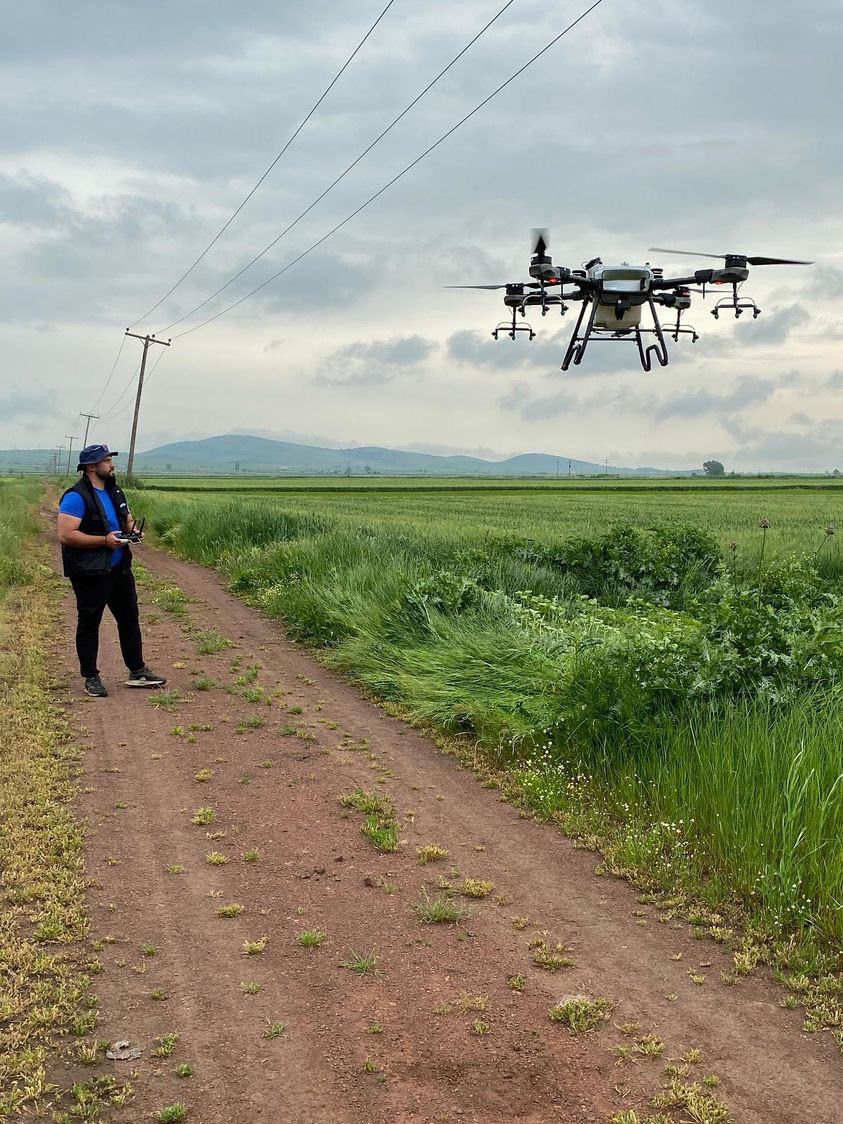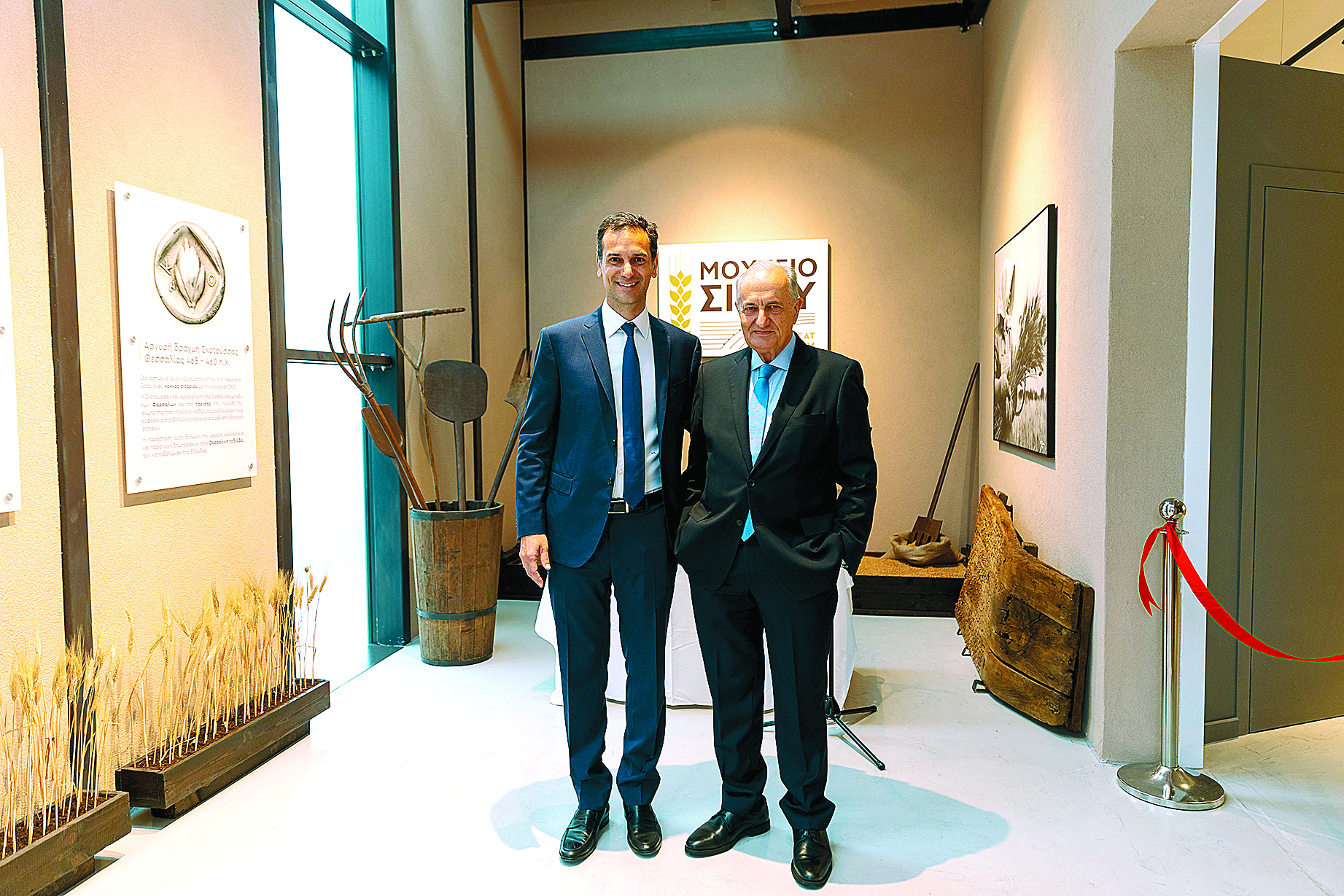
Apostolos Apostolopoulos, now 26, knew from an early age that he wanted to be a farmer. He grew up on the estates his father and grandfather cultivated for 66 years in Ombria Domoku. He wanted to stay in the country, he loved the land. Of course, he didn’t like the way he saw cultivation going on: “With my eyes closed. Depending on what they said in the coffee shop. But every field is different. Plants have mouths and they talk. You just have to listen to them,” he says to “K”. He studied agronomy and in his spare time read about the latest developments in the agricultural sector. At the age of 22, he began working regularly with his father. His family had a multi-year contract with the Melissa company, and they delivered all their grain there, to its factory in Larisa. So when he was told two years ago that someone from Melissa wanted to talk to him, he thought he was needed for something related to the production. But it was something else. An offer to join the Situ Academy run by the company.
For ten years now, professors from the American Agricultural School in Thessaloniki have been visiting Larisa’s factory and teaching “student” farmers, then going out to the fields, discussing solutions to emerging issues and giving them practical advice. Apostolos enthusiastically began attending seminars. At some point, he decided that, based on everything he had learned, it was time to propose to his father some changes in the way their 1,000 acres were farmed. “At first I suggested that he buy a drone for spraying. For cereals, you usually go out into the fields to spray them once. But with a drone, you will go through all the critical stages three times.” But his father did not take it well. “It’s not easy when someone has to deal with the same crop for 45 years. He tells you, sit down, cultivating this land, I raised you, I studied you. You can’t come and undo everything for me.” His son understood his reservations for a different reason. Other farmers took the drone, used it without learning the dosage or procedure, and entire fields were burned. But he convinced him that things were moving fast and that they should do the same. So they were the first in the village to buy it and use it, already seeing very good results (as well as uploading a TikTok video of the process with background music and lots of likes).
At the completion of the cycle of seminars, Apostolos passed his exams and was selected by Sitow Academy for a full scholarship to study at the American School of Agriculture for one year. Last September he moved to Thessaloniki.
“This is the best thing that can happen to you if you are a farmer,” Andreas Koutugias, a former Situ Academy fellow, told K. “At school, you learn things you didn’t even know existed. Even the things we did every day now got an answer why we did it or how to do it the right way,” he says.

We walk across one of his family’s acres near Farsala. His father, Giorgos Koutougias, is with us. His grandfather Vasilis was also supposed to come. Today he is ninety-six years old, he started farming 80 years ago. “Even on good days, he asks us to bring him to the estate to see the harvest,” says Andreas. Unlike other farmers in the second or third generation, he never felt compelled to work. He studied engineering, but in the midst of a huge crisis in the construction industry, he began to help his father. When “Melissa” gave him the opportunity to attend seminars and then receive a scholarship to study in Thessaloniki, he made a decision. “I felt that I could handle the earth scientifically. Like this is the future,” he explains.
At first, Father Apostolos did not approve of the spraying of drones. “He tells you, sit down, cultivating this land, I raised you, I studied you. You can’t come and undo everything for me.”
Although he has no regrets – he loves what he does – he stresses that it’s not an easy path. And certainly a young man cannot dare to try if there are no funds from the family – the equipment, which is now absolutely necessary, costs 200,000 euros, and subsidies from the state are reduced every year, but also postponed. Many farmers find it difficult to join programs. “It could be months before we raise that money, which means we often can’t be consistent with our clients and partners,” notes Andreas.
He and his brother succeed through very good planning. In this, he says, their father and grandfather helped. “A farmer in Greece didn’t know what pen and paper were. Everything was done without a plan for the next day, which resulted in them walking in and then wondering why. In the 90s, when a lot of subsidies were released, those who invested in cultivation developed and are in a very good stage. But if they did it for vacations, cars and vacations, now we rent out their fields,” he notes. Currently, their family cultivates 2,000 acres of land, 600 of which are leased. Of course, this year they lost 400 of them because the owners preferred to rent them out for photovoltaics.
Andreas set himself the goal of constantly developing. He feels happy because his father, who is still at work, supports him in this. “And he did the same. He brought the biggest tractor to the village and everyone looked at him with curiosity,” he recalls. Now he wants to go organic and reduce his carbon footprint. He notices that the timing of planting and harvesting “although my grandfather remembers that in previous years there were periods of cold in May or heat in winter,” he notes.He draws inspiration from these stories, he says, because he sees that climate change is already here, and it scares him.
He is also aided in this journey through his new profession by the communication he maintains with his fellow students at the American School of Agriculture. “With Thanasis of Giannitsa, who also produces wheat, but with lower yields than me, or with Nikos of Thebes, who has large cotton yields. We communicate at least once a month. We discuss our harvests, emerging issues. And we help each other.” The same thing happens with school professors. In addition to the 160 farmers who have participated in the Academy over these ten years, 700 farmers participating in the Melissa contract farming program are connecting to electronic platforms, registering their crop data with the help of professors, which they process using specialized software to determine the ideal fertiliser, as well as the possible risks of diseases, while the yield of the crop is also predicted with very high accuracy, giving them practical advice.
“Situ Academy was launched with the aim of improving the quality of the product produced. This was done, but a community was created along the way. As long as we know each other, we see farmers open up, talking openly about problems and mistakes they may have made. And this is even more valuable for the future of agricultural production,” says Professor Konstantinos Zukidis of the school.

Situ Museum: House of Village Memory
Last week, Mr. Zukidis and the young farmers who spoke to “K” were in Larissa, invited by the management of the “Melissa” factory, to celebrate the 10th anniversary of the Sitou Academy. “In these ten difficult years, despite crises and capital controls, we have not stopped progressing, investing in our farmers’ education, research and technology. Our goal is to promote excellence in agricultural production as well,” said Alexandros Kikizas, talking about his vision. And school president Jeff Lansdale thanked him, while expressing great concern about the future of the farming profession. “Greek parents cannot think that this profession is a failure for their children. We have to change this mentality,” he said.
The evening ended with the opening of the Wheat Museum. The initiative of the president of the company, George Kikiza, father of Alexandros, in the space next to the academy and behind the factory, which he himself brought to Larissa exactly 50 years ago. “The last few years when I was retired, I had the opportunity to attend a lot of extracurricular activities,” he told the audience with a laugh. This idea has been circling in his head for years, or rather, whenever he found any item related to wheat in an antique store. He bought it enthusiastically and kept it in his house in Athens. When he heard five years ago that several warehouses were going to be demolished behind the factory, he asked his son to keep them. He carried out repairs and moved the original collection there, while he began to intensively search all over Greece for other objects: classic tractors, old cars, paintings, stamps, banknotes, while he worked closely with Vanya Tlupa, daughter of Takis Tlupa, which he photographed the Thessalian land and farmers in a unique way.
By creating this museum, he felt that he was paying homage to the Greek farmer, as well as his own family’s journey, which began 100 years ago when his father, along with his brothers, opened a grocery store in a small village in Arcadia, and then a pasta factory in Athens. Or when he himself, at a young age, made the “bold but correct” decision to move the factory to Larissa. When he made his first tour of the museum, he was happy and excited. The young farmers felt the same way. “These stories are told to us by our grandparents. We are looking forward, we are developing, but for this we need to look back. Let’s not forget how we started,” Apostolos said after the tour ended.
Source: Kathimerini
Ashley Bailey is a talented author and journalist known for her writing on trending topics. Currently working at 247 news reel, she brings readers fresh perspectives on current issues. With her well-researched and thought-provoking articles, she captures the zeitgeist and stays ahead of the latest trends. Ashley’s writing is a must-read for anyone interested in staying up-to-date with the latest developments.